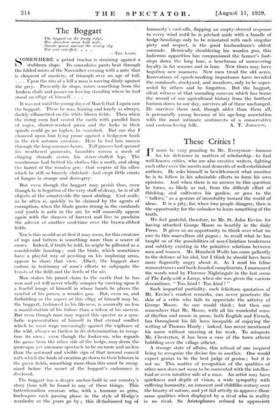The Boggart
The bogyart on the frosty ridge, His sleeveless arms held wide, Stands gaunt against the wintry sky For ever crucified. . . .
—THE LIND.
OMEWHERE a petrol tractor is straining against a 17 stubborn slope. Its convulsive pants beat through the folded mists of the November evening with a note that is eloquent of mastery, of triumph over an age of toil. . . . Upon the rim of a hill a man is moving dimly against the grey. Presently he stops, raises something from the broken clods and passes on leaving standing where he had stood an effigy of himself. . . .
It was not until the young days of March that I again saw the boggart. There he was, leaning and lonely as always, darkly silhouetted on the white blown fields. Then when the rising corn had scored the earth with parallel lines of eager, shower-washed green and the larks' in their spirals could go no higher, he vanished. But one day I chanced upon him lying prone against a hedgerow bank in the rich autumn sunshine. Here lie had lain unseen through the long 'summer hours. Tall grasses had speared his weathered garments, brambles woven a mesh of clinging strands across his straw-stuffed legs. The woodmouse had fretted his clothes like a moth, and along the barrel of the wooden gi-I—that sceptre of his office which he still so bravely clutched----had crept little crusts of fungus in orange and dove-grey.
But even though the boggart may perish thus, even though he is begotten of the very stuff of decay, he is of all objects of the countryside the most abiding. Cast aside, as lie often is, quickly to be claimed by the agents of corruption, when the blade grows strong in the cornlands and youth is astir in the air, he will assuredly appear again with the sheaves of harvest and live to proclaim the advent of another seed-time over the brown-ribbed fields.
Nor is this so odd as at first it may seem, for this creature of rags and tatters is something more than a soarer of crows.. Indeed, if truth be told, he might be pilloried as a considerable humbug ; and the birds, which sometimes have a playful way of perching on his imploring arms, appear to share that view. Albeit, the boggart does endure in testimony of man's efforts to subjugate the beasts of the field and the fowls of the air.
Man stakes his proud claim to, the earth that he has won and yet will never wholly conquer by erecting upon it a fearful image of himself in whose hands he places the symbol of his power, a wooden gun. But, even so, and forbidding as the aspect of this effigy of himself may be, the boggart, fashioned in his likeness, is assuredly no less a manifestation of his failure than a token of his success. But even though man may regard this spectre as a sym- bolic representation of himself in that eternal conflict which lie must wage unceasingly against the vigilance of the wild, always so tireless in its determination to recap- ture its own ; even though the looker-on, who regards the game from the other side of the hedge, may deem the grotesque yet awesome spectacle to be no more and no less than the outward and visible sign of that inward conceit with which the lords of creation go down to their labours in the green fields, something more than this must be recog- nized before the secret of the boggart's endurance is disclosed.
• The boggart has a deeper anchor-hold in our country's story than will be found in any of these things. This tatterdemalion creature who, with a humour so grim, burlesques each passing phase in the style of HOdge's wardrobe as the years go by ; this ill-fashioned tag of humanity's cast-offs, flapping an empty-sleeved response to every wind until he is pitched aside with a bundle of hedge-brushings only to be reinstated with such singular piety and respect, is the good husbandman's oldest comrade. Heroically shouldering his wooden gun, this ludicrous apparition has companioned the farmer's foot- steps down the long lane, a henchman of unwavering loyalty in fat seasons and in. lean. New times may have begotten new manners. New men tread the old acres. Innovations of epoch-marking importance have invaded the cornlands, stockyard, and meadows, only to be super- seded by others and be forgotten: But the boggart, silent witness of that unending caravan which has borne the record of our agricultural history from the furthest horizon down to our day, survives all of these unchanged. He survives them and, though older than them all,. is perennially young because of his. age-long association with the most intimate " sentiments of a conservative
































 Previous page
Previous page